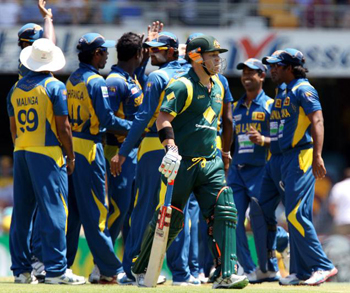 Brisbane, Jan 18: Nuwan Kulasekara claimed five wickets to rip through Australia’s top order and help Sri Lanka dismiss the hosts for a humiliating 74 in the third limited—overs international on Friday.
Brisbane, Jan 18: Nuwan Kulasekara claimed five wickets to rip through Australia’s top order and help Sri Lanka dismiss the hosts for a humiliating 74 in the third limited—overs international on Friday.
Australia, boasting the return of regular captain Michael Clarke, and test stars David Warner and Matthew Wade, crumbled in the face of Kulasekara (5—22) after winning the toss and electing to bat first.
Once Angelo Mathews (1—10) had Warner caught in the second over, Kulasekara removed opening partner Phil Hughes, David Hussey, George Bailey, Clarke and Moises Henriques in succession to leave the hosts reeling on 30—6.
Tailender Mitchell Starc top scored with an unbeaten 22, rescuing Australia from an even more dismal score, having been 40—9.
Warner made just 4 runs before offering a catch to Eranga at mid—on and Hughes had 3 when he became Kulasekara’s first victim with an edge to slip three overs later.
Clarke, a prolific scorer in test cricket this Australian summer, made 9 runs before losing his middle stump and Henriques (2) joined him in the dressing room two balls later with Australia facing a humbling total.
Lasith Malinga chimed in shortly after to remove test wicketkeeper Wade for 8 runs and dismissed Clint McKay for a duck.
Starc and spinner Xavier Doherty shared a gritty 34—run partnership for the last wicket before Eranga had Dohery caught by Jeevan Mendis for 15 to end the innings.
Hussey was given not out to a Kulasekara inswinger caught by keeper Kusal Perera, but Jayawardene won the wicket on appeal. Television replays showed a clear edge.
Australia were 3-21 in the eighth over.
The Sri Lankan swinger had George Bailey lbw first ball and then beat Clarke, one of the best Test batsmen in the world, to hit middle stump.
Sri Lanka had the hosts 5-28 and facing their lowest ever ODI score.
New boy Moises Henriques, back in the side after three years out, went two balls later with the score 6-30.
Mitchell Johnson, Matthew Wade and Clint McKay quickly followed them back to the dressing room as slinger Malinga picked up quick wickets.
Fast bowler Mitchell Starc showed batting was not impossible and clipped 22 runs off 28 balls before Xavier Doherty offered a simple catch off Eranga to put an end to the innings.





Comments
Add new comment